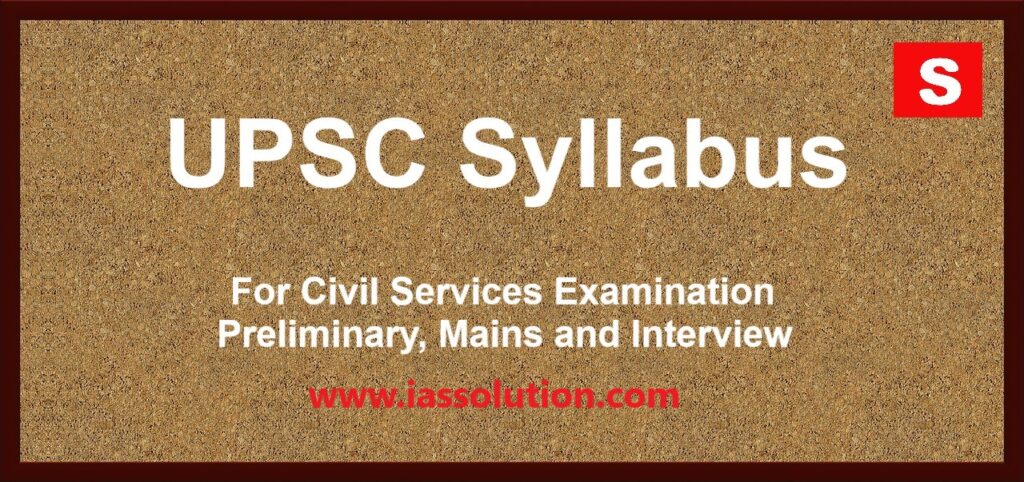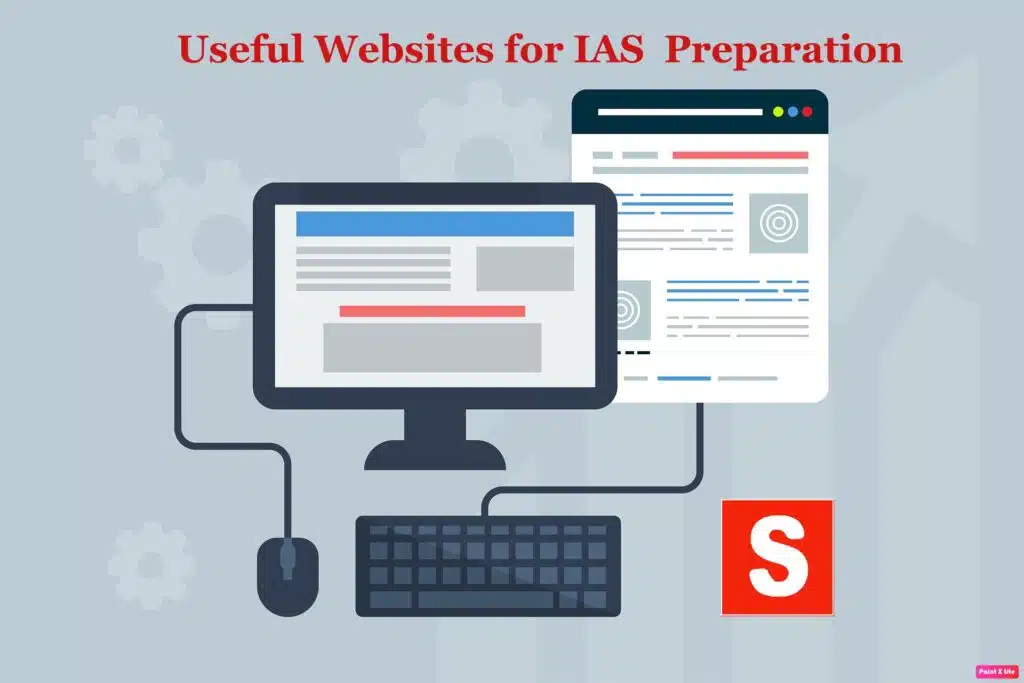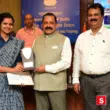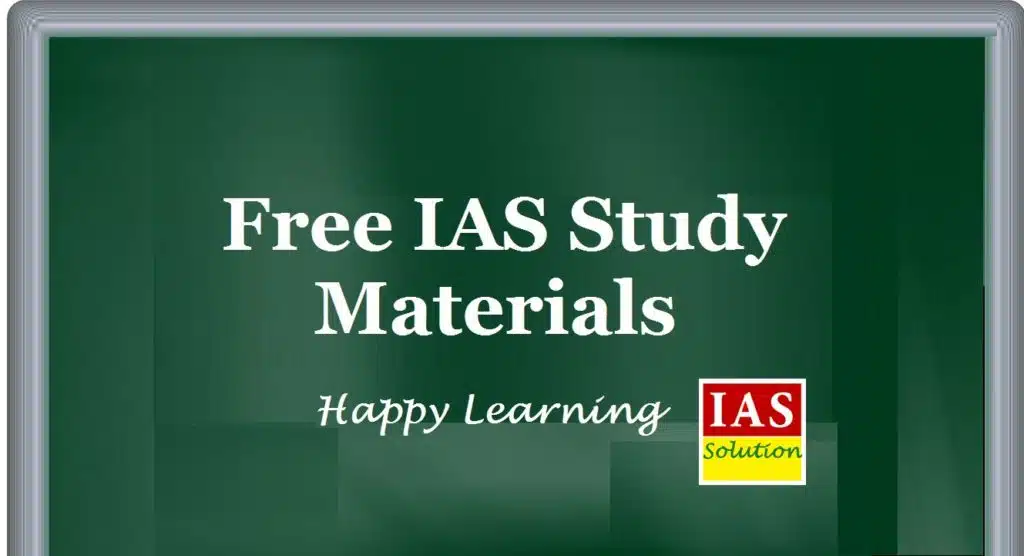UPSC Syllabus 2026 – Civil Services Prelims, Mains and Interview

The UPSC Syllabus is a crucial roadmap for aspiring civil service aspirants, serving as a foundation for one of India’s most competitive examinations. Understanding the intricacies of the IAS Syllabus is essential for effective preparation, as it outlines the subjects, topics, and skills required to excel in the Civil Services Examination.
This guide delves into the key components of the UPSC Syllabus, highlighting its structure across the Prelims, Mains, and Interview stages. By familiarizing yourself with the syllabus, you can strategically plan your study schedule, choose relevant resources, and focus on areas that align with your strengths. Whether you are a first-time aspirant or looking to refine your study approach, grasping the UPSC syllabus is the first step towards achieving your dream of becoming an IAS officer.
UPSC Syllabus for Prelims
Firstly, the UPSC Preliminary exam comprises two papers and both are compulsory. Each paper consists of 200 marks and of two hours duration. In fact, both these papers are objective type and it will be in two sets [English and Hindi].
These papers are also considered as general studies-1 and general studies-2. Although general studies paper -2 is only a qualifying paper, aspirants should obtain 33%of marks. General Studies -2 is also known as CSAT ( Civil Service Aptitude Test).
UPSC Prelims Syllabus for GS Paper 1 (200 Marks)
- Current affairs: This includes matters relating to current events, both national and international importance.
- History: It consists of the Indian national movement and the history of India.
- Geography [Indian and world]: It comprises physical, social, and economic geography.
- Environment: Aspirants should include environmental ecology, biodiversity, and general issues on climatic change and general science.
- Indian polity and governance: Constitution of India, political system, Panchayati Raj, etc.
- Economics: It consists of social sector initiatives, sustainable development, inclusion, demographics poverty, etc.
- General Science – Basic Science and Technologies which are useful in our daily life
The duration is of two hours and marks out of 200.
UPSC Prelims Syllabus for GS Paper 2 (200 Marks)
- Problem-solving and decision-making
- General mental ability
- Comprehension
- Analytical and logical reasoning
- Data Interpretation.
- Interpersonal skills including communication skills.
The duration is of two hours and marks out of 200. Presently, this paper will not consider passing prelims. However, you have to secure a minimum of 33% of 200 marks, ie 66 marks.
UPSC Syllabus for Mains
The marks you score for the Mains examination and interview sessions will decide your ranking. The UPSC mains consist of 1750 marks. Moreover, the interview consists of 275 marks. UPSC mains consists of nine papers out of which seven are counted for final ranking. The rest two are language papers in which aspirants should secure minimum marks prescribed by UPSC every year. However, there is an exception for candidates residing in northeastern states. As a result, they only have to attempt the English language only.1.
1. Paper‐1: (Essay) – 250 Marks
In Essay Paper, candidates may be required to write essays on multiple topics. They will be expected to keep closely to the subject of the essay to arrange their ideas in an orderly fashion and to write concisely. Credit will be given for effective and exact expression.
2. Paper 2: (General Studies 1) – 250 Marks
General Studies Paper 1 Syllabus of Civil Services Mains Exam comprises three major areas which Indian Heritage and Culture, History, and Geography of the World and Society. The detailed syllabus is given below as per UPSC notification. General Studies Paper 1 Syllabus for UPSC Civil Services Mains
- Indian culture will cover the salient aspects of Art Forms, Literature and Architecture from ancient to modern times.
- Modern Indian history from about the middle of the eighteenth century until the present- significant events, personalities, issues.
- The Freedom Struggle – its various stages and important contributors /contributions from different parts of the country.
- Post-independence consolidation and reorganisation within the country.
- History of the world will include events from 18th century such as industrial revolution, world wars,
- redrawal of national boundaries, colonisation, decolonisation, political philosophies like communism,
- capitalism, socialism etc.- their forms and effect on the society.
- Salient features of Indian Society, Diversity of India.
- Role of women and women’s organisation, population and associated issues, poverty and
- developmental issues, urbanisation, their problems and their remedies.
- Effects of globalisation on Indian society
- Social empowerment, communalism, regionalism & secularism.
- Salient features of the world’s physical geography.
- Distribution of key natural resources across the world (including South Asia and the Indian subcontinent);
- factors responsible for the location of primary, secondary, and tertiary sector industries in
- various parts of the world (including India)
- Important Geophysical phenomena such as earthquakes, Tsunami, Volcanic activity, cyclone etc.,
- geographical features and their location- changes in critical geographical features (including water bodies and ice-caps) and in flora and fauna and the effects of such changes.
3. Paper 3: (General Studies 2) – 250 Marks
General Studies 2 Paper Syllabus of UPSC Civil Services Mains Exam comprises of four major areas: Governance, Constitution, Polity, Social Justice and International relations. The detailed syllabus is as follows below:
- Indian Constitution- historical underpinnings, evolution, features, amendments, significant provisions and basic structure.
- Functions and responsibilities of the Union and the States, issues, and challenges pertaining to the
federal structure, devolution of powers and finances up to local levels and challenges therein. - Separation of powers between various organs disputes redressal mechanisms and institutions.
- Comparison of the Indian constitutional scheme with that of other countries
- Parliament and State Legislatures – structure, functioning, the conduct of business, powers & privileges
and issues arising out of these. - Structure, organisation, and functioning of the Executive and the Judiciary Ministries and Departments of the Government; pressure groups and formal/informal associations and their role in the Polity.
- Salient features of the Representation of People’s Act.
- Appointment to various Constitutional posts, powers, functions, and responsibilities of various
Constitutional Bodies. - Statutory, regulatory and various quasi-judicial bodies.
- Government policies and interventions for development in various sectors and issues arising out of their design and implementation.
- Development processes and the development industry- the role of NGOs, SHGs, various groups and associations, donors, charities, institutional and other stakeholders.
- Welfare schemes for vulnerable sections of the population by the Centre and States and the
performance of these schemes; mechanisms, laws, institutions, and Bodies constituted for the
protection and betterment of these vulnerable sections. - Issues relating to the development and management of Social Sector/Services relating to Health,
Education, Human Resources. - Issues relating to poverty and hunger.
- Important aspects of governance, transparency and accountability, e-governance- applications,
models, successes, limitations, and potential; citizens charters, transparency & accountability and
institutional and other measures. - Role of civil services in a democracy.
- India and its neighborhood- relations.
- Bilateral, regional, and global groupings and agreements involving India and/or affecting India’s
interests. - Effect of Policies and Politics of Developed and developing countries on India’s Interests, Indian
Diaspora. - Important International institutions, agencies, and fora- their structure, mandate.
4. Paper 4: (General Studies 4) – 250 Marks
General Studies Paper 3 Syllabus for UPSC Civil Services Mains Exam comprises of five major areas such as Technology, Economic Development, Biodiversity, Environment, Security and Disaster Management. The detailed syllabus of General Studies Paper 3 as provided by UPSC is as below:
- Indian Economy and issues relating to planning, mobilization of resources, growth, development, and employment.
- Inclusive growth and issues arising from it.
- Government Budgeting.
- Major crops cropping patterns in various parts of the country, different types of irrigation and
irrigation systems storage, transport, and marketing of agricultural produce and issues and related
constraints; e-technology in the aid of farmers - Issues related to direct and indirect farm subsidies and minimum support prices; Public Distribution
System- objectives, functioning, limitations, revamping; issues of buffer stocks and food security;
Technology missions; economics of animal-rearing. - Food processing and related industries in India- scope and significance, location, upstream and
downstream requirements, supply chain management. - Land reforms in India.
- Effects of liberalization on the economy, changes in industrial policy, and their effects on industrial
growth. - Infrastructure: Energy, Ports, Roads, Airports, Railways, etc.
- Investment models.
- Science and technology- developments and their applications and effects in everyday life
- Achievements of Indians in science & technology; indigenization of technology and development of new technology.
- Awareness in the fields of IT, Space, Computers, robotics, nano-technology, bio-technology, and
issues relating to intellectual property rights. - Conservation, environmental pollution, and degradation, environmental impact assessment
- Disaster and disaster management.
- Linkages between development and spread of extremism.
- Role of external state and non-state actors in creating challenges to internal security.
- Challenges to internal security through communication networks, the role of media and social networking sites in internal security challenges, basics of cybersecurity; money-laundering and its prevention
- Security challenges and their management in border areas; linkages of organised crime with
terrorism - Various Security forces and agencies and their mandate.
5. Paper 5: (General Studies 4 ) – 250 Marks
General Studies Paper 4 Syllabus for UPSC Civil Services Mains Exam comprises three major areas ie Ethics, Integrity, and Aptitude. Details of the syllabus as provided by UPSC is as below: This paper will include questions to test the candidates’ attitude and approach to issues relating to integrity, probity in public life and his problem-solving approach to various issues and conflicts faced by him in dealing with society. Questions may utilise the case study approach to determine these aspects. The following broad areas will be covered:
- Ethics and Human Interface: Essence, determinants, and Consequences of Ethics in human actions;
dimensions of ethics; ethics in private and public relationships. Human Values – lessons from the
lives and teachings of great leaders, reformers, and administrators; the role of family, society and
educational institutions in inculcating values. - Attitude: content, structure, function; its influence and relation with thought and behavior; moral and political attitudes; social influence and persuasion.
- Aptitude and foundational values for Civil Service, integrity, impartiality, non-partisanship,
objectivity, dedication to public service, empathy, tolerance, and compassion towards the weaker sections. - Emotional intelligence concepts, and their utilities and application in administration and governance.
- Contributions of moral thinkers and philosophers from India and the world.
- Public/Civil Service Values and Ethics in Public administration: Status and problems; ethical concerns and dilemmas in government and private institutions; laws, rules, regulations, and conscience as sources of ethical guidance; accountability and ethical governance; strengthening of ethical and moral values in governance; ethical issues in international relations and funding; corporate governance.
- Probity in Governance: Concept of public service; Philosophical basis of governance and probity;
Information sharing and transparency in government, Right to Information, Codes of Ethics, Codes of Conduct, Citizen’s Charters, Work culture, Quality of service delivery, Utilisation of public funds,
challenges of corruption. - Case Studies on the above issue
6. Paper 6: (Optional Subject Paper 1) – 250 Marks
7. Paper 7: (Optional Subject Paper 2) – 250 Marks
UPSC SYLLABUS OPTIONAL SUBJECTS
- History Syllabus – UPSC Civil Services Mains Exam.
- Geography Syllabus – UPSC Civil Services Mains Exam.
- Public Administration Syllabus – UPSC Civil Services Mains Exam.
- Economics Syllabus – UPSC Civil Services Mains Exam.
- Sociology Syllabus – UPSC Civil Services Mains Exam.
- Political Science Syllabus –UPSC Civil Services Mains Exam.
- Philosophy Syllabus – UPSC Civil Services Mains Exam.
- Psychology Syllabus – UPSC Civil Services Mains Exam.
- Agriculture Syllabus – UPSC Civil Services Mains Exam.
- Animal Husbandry and Veterinary Science Syllabus – UPSC Civil Services Mains Exam.
- Anthropology Syllabus – UPSC Civil Services Mains Exam.
- Botany Syllabus – UPSC Services Mains Exam.
- Chemistry Syllabus – UPSC Civil Services Mains Exam.
- Civil Engineering Syllabus – UPSC Civil Services Mains Exam.
- Commerce Syllabus – UPSC Civil Services Mains Exam.
- Electrical Engineering Syllabus – UPSC Civil Services Mains Exam.
- Geology Syllabus – UPSC Civil Services Mains Exam.
- Law Syllabus – UPSC Civil Services Mains Exam.
- Mathematics Syllabus – UPSC Civil Services Mains Exam.
- Management Syllabus – UPSC Civil Services Mains Exam.
- Mechanical Engineering Syllabus – UPSC Civil Services Mains Exam.
- Medical Science Syllabus – UPSC Civil Services Mains Exam.
- Physics Syllabus – UPSC Civil Services Mains Exam.
- Statistics Syllabus – UPSC Civil Services Mains Exam.
- Zoology Syllabus – UPSC Civil Services Mains Exam.
- Literature of any one of the following languages: Assamese, Bengali, Bodo, Dogri, Gujarati, Hindi, Kannada, Kashmiri, Konkani, Maithili, Malayalam, Manipuri, Marathi, Nepali, Oriya, Punjabi, Sanskrit, Santhali, Sindhi, Tamil, Telugu, Urdu, and English.
Qualifying Paper A – but not counted for final ranking
The Indian Language paper is a qualifying paper in the UPSC Civil Services Mains Exam. The candidates have to choose any one of the Indian languages mentioned in the Eighth Schedule of the Indian Constitution. The paper is of 300 marks and the candidates need to score a minimum of 25% (75 marks) to qualify for the other papers.
The syllabus for the Indian Language paper is as follows:
- Comprehension of given passages
- Precis writing
- Usage and Vocabulary
- Short Essay
- Translation from English to the Indian Language and vice-versa
The following is the list of Indian languages that the candidates can choose from:
- Assamese
- Bengali
- Gujarati
- Hindi
- Kannada
- Kashmiri
- Konkani
- Malayalam
- Manipuri
- Marathi
- Nepali
- Oriya
- Punjabi
- Sanskrit
- Sindhi
- Tamil
- Telugu
- Urdu
Note: The syllabus and languages mentioned above are based on the information available up to my knowledge cut-off date. Check the official UPSC website for the latest updates and information.
Qualifying Paper B – but not counted for Final ranking
Paper ‐ B – English Language Syllabus. 300 Marks.
UPSC Syllabus for Interview
- The shortlisted candidate will be examined by an interview Board and will have before them a bio-data. They will be asked questions/opinions on matters of general interest. The interview aims to examine the personal suitability of the aspirant for a career in public service by a Board of competent and unbiased examiners. The personality test is meant to identify the mental caliber of a candidate. In broad terms, this is an assessment of not only the candidate’s intellectual qualities but also social traits and his/her interest in current affairs. Some of the qualities to be judged are mental alertness, critical powers of assimilation, clear and logical exposition, a balance of judgment, variety, and depth of interest, the ability for social cohesion and leadership, and intellectual and moral integrity.
- The technique of the personality test is not that of a strict cross-examination but of a natural, though directed, and purposive conversation that aims to identify the mental qualities of the candidate.
- The personality test is not intended to be a test either of the specialized or general knowledge of the candidates which has been already tested through their mains written papers. Also, aspirants are expected to have taken an intelligent interest not only in their special subjects of academic study but also in the events which are happening around them both within and outside their own State or Country as well as in modern currents of thought and in new discoveries which should arouse the curiosity of well-educated youth.
Subtotal [Mains written test]:1750 marks
Personality test (Interview): 275 marks
Grand total: 2025 marks
Also read: Know the UPSC Cut off 2024: Detailed cut-off Mark Analysis
UPSC Syllabus in Hindi
Download UPSC Syllabus in Hindi as PDF from here.
Recommended Books for UPSC Preparation
We have prepared an essential UPSC Book list for IAS Preparation as per the suggestion of many toppers. Books also can buy at the offer Price on the provided links. Also read: How to select Optional Subject for IAS Exam?. IASSolution Prelims Mock Test SeriesSimply reading standard books and materials will not help you to perform in the real UPSC Exam. Firstly, you need to identify your weak area and then try to improve it. You can improve your ability to perform in an actual exam only when tested in the exam atmosphere with negative marking. Take free UPSC Prelims Online Mock Tests by IASSolution to find where you stand, what are the weak and strong areas in our artificial intelligence-enabled exam platform. Happy learning! Important UPSC Exam updates and other information
- IAS Exam Pattern
- IAS Exam Eligibility
- UPSC Age Limit
- New IAS/IPS Allocation Policy Proposal
- IASSolution Prelims Online Test Series
FAQ About UPSC Syllabus
A1: Download UPSC Syllabus in Hindi as a PDF from here.
A2: The UPSC syllabus has different subjects under four General Studies papers, namely GS Paper 1 (History, Geography, and Indian Society), GS Paper 2 (Indian Polity, Governance, Constitution, and International Relations), GS Paper 3 (Indian Economy, Science & Technology, Agriculture, and Environment), and GS Paper 4 (Ethics, Integrity, and Aptitude).
A3: The application fee for UPSC is Rs. 100. However, female candidates and candidates belonging to SC/ST/PH categories are exempted from paying the fee.
A4: Yes, the IAS syllabus is considered tough due to its vastness and comprehensiveness, but with proper planning and dedicated preparation, it can be cracked.
A5: Yes, the UPSC syllabus PDF contains the complete syllabus for both prelims and mains exams, including optional subjects.
A6: The official UPSC syllabus PDF is published in English and Hindi languages only. However, aspirants can translate the syllabus into their preferred language using online translation tools.










Leave a Reply